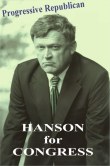
Burton Hanson for Congress
GOP Primary - MN 3rd District
|
Strength and Prosperity Through Peace
|
Auto Insurance Reform
Unlicensed, uninsured motorists - 17 million of 'em. Robert Miniter has an Op/Ed piece dated 09.10.2001 in the Wall Street Journal's Opinion Journal making a plausible argument that illegal aliens -- of whom there are an estimated six to nine million -- should be allowed to obtain driver's licenses. He notes, although it is not the point of his piece, that there are an estimated 17 million unlicensed drivers, a very high per cent of whom are illegal aliens and presumably almost all of whom are uninsured. One in five fatal accidents involves an unlicensed (and therefore uninsured) driver. "As a result," says Miniter, "auto insurance rates for law-abiding Americans are artificially higher. Insurance companies have learned the hard way that unlicensed, uninsured drivers rarely pay up -- so you do." While Miniter at that point moves on to other matters to support his main argument, I would like to stop at that point and remind everyone that there is a sensible solution to the problem of high insurance rates we all pay because there are so many uninsured motorists. It's called pay-at-the-pump auto insurance. Many insurance companies, oil companies and personal injury lawyers apparently don't like the idea, as the popular consumer finance writer Andrew Tobias found out in promoting his version of the plan in California. But it is an idea that I think merits careful consideration by lawmakers -- on the federal level to prevent obvious problems that would arise if some states enacted pay-at-the-pump and others didn't. Since everyone has to buy gas to drive, motorists who now drive without insurance could not escape paying, something you and I now pay for indirectly. Moreover, they, like everyone else, would pay according to their use of fuel. Therefore, an additional benefit of the plan, among several, is that it would encourage use of fuel efficient vehicles and it would mean people who don't drive as many miles, e.g., older and retired drivers, would not pay as much as people who drive more than the average amount. The idea is explained here in detail. It is an example of a paradox, creating a kind of "tax" that in effect would put more money back in the pockets of every driver who now complies with the laws mandating the purchase of auto insurance. Those who do not now comply with that law would be able to comply on a pay-as-you-go basis by paying their fair share; indeed, they would not be able to avoid complying.
Copyright (c) 2004 by Burton Randall Hanson. Prepared & published by candidate on his own behalf and at his own expense. Candidate may be reached by e-mail at burtonhanson@burtonhanson.com. Candidate does not solicit or accept contributions or endorsements.